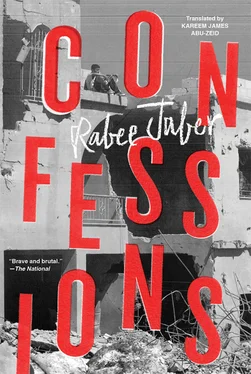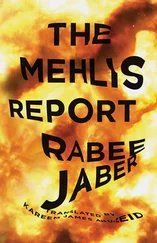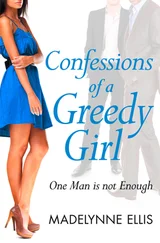Rabee Jaber - Confessions
Здесь есть возможность читать онлайн «Rabee Jaber - Confessions» весь текст электронной книги совершенно бесплатно (целиком полную версию без сокращений). В некоторых случаях можно слушать аудио, скачать через торрент в формате fb2 и присутствует краткое содержание. Год выпуска: 2016, Издательство: New Directions, Жанр: Современная проза, на английском языке. Описание произведения, (предисловие) а так же отзывы посетителей доступны на портале библиотеки ЛибКат.
- Название:Confessions
- Автор:
- Издательство:New Directions
- Жанр:
- Год:2016
- ISBN:нет данных
- Рейтинг книги:3 / 5. Голосов: 1
-
Избранное:Добавить в избранное
- Отзывы:
-
Ваша оценка:
- 60
- 1
- 2
- 3
- 4
- 5
Confessions: краткое содержание, описание и аннотация
Предлагаем к чтению аннотацию, описание, краткое содержание или предисловие (зависит от того, что написал сам автор книги «Confessions»). Если вы не нашли необходимую информацию о книге — напишите в комментариях, мы постараемся отыскать её.
doesn’t shy away from the horrible truth of his murderous father — instead he confronts his troubled upbringing and seeks to understand the distortions and complexities of his memories, his war-torn country, and the quiet war that rages inside of him.
Confessions — читать онлайн бесплатно полную книгу (весь текст) целиком
Ниже представлен текст книги, разбитый по страницам. Система сохранения места последней прочитанной страницы, позволяет с удобством читать онлайн бесплатно книгу «Confessions», без необходимости каждый раз заново искать на чём Вы остановились. Поставьте закладку, и сможете в любой момент перейти на страницу, на которой закончили чтение.
Интервал:
Закладка:
One time, he was fixing the living room door, the hinge of the door, that door led to the hallway and made an awful creaking sound whenever we opened it. Mary oiled it, and the oil worked for two days, but then it started creaking again. “We’ll change it,” Ilya said. He got out the toolbox and began taking the door off the hinge. He was unscrewing the old hinge when the shelling intensified, and bombs began falling behind the house, in the direction of the church. He stopped working and looked at Liliane. She was terrified of how he looked when he bit down on his lower lip. She was afraid of him, and she’d hide her face so he wouldn’t raise his voice, even though he usually didn’t raise his voice in front of mother. The shelling died down — or rather, it moved farther away — and so he went back to work on the old hinge and tried to take it off the door. At a certain moment he stopped trying. I saw the red liquid on his hand. He stood up holding the old door and smashed it against the wall, breaking it in two.
I remember how he used to come to school to get me whenever the shelling started. He came in an open-air jeep and drove the jeep into the middle of the schoolyard. No one could stop him. He’d take my heavy backpack from me and say, “Quickly, quickly.” And in a flash we’d be back home. I remember the tires hissing on the asphalt amid the din of gunfire and screaming.
On one of those occasions I saw a man crawling on the sidewalk. He lifted his hand and looked up at us as we drove by in the jeep without stopping. I remember the blood on his face, and the filth on the walls. But he wasn’t filthy.
That memory blends together with another one: We were in the safe room — not our living room, but the safe room of a building near our house, this one was underground — it was a storeroom, and now it’s part of a supermarket — we were in the safe room and the power was out, only the emergency neon light was buzzing. The neon light was buzzing, and someone came in from outside, took off his coat, and started cleaning it. The smell of rain and gunpowder came in with him, and I heard him say that Broadwell — the ful maker — was splattered all over the tree in front of the store. In the Lebanese dialect, we use the word “bits” sometimes. He said, “His bits are splattered all over the tree.” I didn’t understand what he was saying at first, but then I understood: he said “his bits” were all over the cherry tree, “His bits are splattered over the whole tree.” Over the whole tree.
We went there once the shelling stopped, once we could go outside again. A day or two had passed, I don’t know how long exactly. They’d cleaned up the place, but you could see the marks the shell had left on the road and the gouges the shrapnel had left in the walls. The cherry tree’s branches were broken. I used to watch it bloom in the spring, I used to gaze at its lovely white flowers. But I don’t remember ever seeing any red cherries on it. Maybe it did bear cherries, and the kids who were bigger than me ate them while they were still green, I don’t know. But I remember the white flowers, and I remember the boy I was sitting in the dimly-lit restaurant — I used to love that darkness, the darkness that hid me from prying eyes, hid me from my sister who would get upset if she passed by and saw me eating there, rather than at home, and I didn’t want to make her angry, but at the same time I wanted to eat there, I loved eating there — I remember that boy dipping a piece of bread into the hot ful submerged in oil, and I remember him lifting that piece from the bowl to his mouth, how he ate onions and fresh mint and chopped tomatoes with the ful , and how he licked his fingers afterward. The ful maker would slice pickled turnips just for me, his fingers always steady against the knife, though they trembled whenever he struck a match to light a cigarette. I remember that boy sitting in the restaurant, and I remember the smoke rising from the cigarette, and I remember the sun casting light on the blooming cherry tree.
For a long time I couldn’t pass by that sidewalk without looking at the tree. Years went by: new shops sprouted up, the sidewalk was widened, and the whole neighborhood changed. Many houses remained as they were, but others disappeared, replaced by tall buildings — yes, the whole street has changed: there are places that never see any sunlight now — they’re covered in shadows from morning to night. And the cherry tree’s gone. I don’t know when they cut it down, but I still remember where it was.
Gone? Was it ever really there? There were a lot of us in the safe room: the residents of entire buildings would go down to that shelter when the shelling intensified. We knew the shriek of the rockets, and we knew which ones could pass through several floors of a building before exploding. Whenever we heard those shrieks in the sky, we’d run to that underground shelter. There were a lot of us down there. I remember the neon light buzzing, and I remember the man wiping the water from his hair and the coat hanging from his hand. I don’t remember his voice, but the words — the traces of his words — still paint a picture in my mind, to this very day. And the others who were with me in the safe room, do they remember? Of course they do — at least some of them. Don’t they? I’d like to know how they remember that incident.
I don’t remember my father in the safe room. I remember Ilya pulling out heavy boxes and spreading things on the ground for my mother to sleep on. I remember a man with his family in the corner (the Taniyus family). He was holding his wife in one arm and his children in the other: all of them were trembling, and whenever they opened their eyes you could see the whites, even in the darkness you could still see the whites of their eyes. A moment came when darkness prevailed and the noise died down, when all you could hear was a prayer or a murmur, and also the snoring of an old woman in the corner of the room — in that darkness, no one could find her to shake her and stop the snoring. There were more than seventy people down there. Do I remember all their names? I used to know everyone in the neighborhood, and sometimes people from outside the neighborhood would come to that safe room as well: passersby who were caught off guard by the shelling, who’d rushed to the entrance of the building. There was a long staircase descending underground. I remember the lumps of hardened wax on the stairs, and I remember the colored plastic water bottles at the bottom of the stairs. I remember once, when I was half-asleep between my mother and sister, someone sparked their lighter in the darkness: I saw the light rise, and I saw a woman’s face, round and yellow, her sweaty and disheveled blond hair around her ears — she was looking for a slipper, or something else she’d lost. I remember people swearing and praying, and I remember the crackling of a small transistor radio rounding out the night. I remember the man who looked after that building: he grabbed a cup of tea one day at sunset, went outside to inspect the street for a moment, and never came back.
I don’t remember my father in the safe room. He’d disappear whenever the fighting started up, and sometimes he’d disappear before it started too. He’d only come home to eat or sleep. Mother’s health would improve for short periods, and she’d get out of bed and wander from room to room. When that happened, white sheets would appear on the ground in the sitting room (where we never sat), with rows of delicious date cookies ( maamoul ) lined upon them. My father always wanted to celebrate whenever mother’s health improved. I remember the first time I heard him say, as he was drinking his morning coffee, “The butcher’s begun the slaughter.” Was it the first time? I remember my sisters’ joyful faces, and I remember my mother laughing and Ilya laughing too. That was an old expression in the family, an expression that meant something, as if it were the secret password to enter a palace they all knew about. It was new to me, though, because I was young, because I was a newcomer, and now I hardly know what it means anymore. My father got dressed and left without taking the car keys, and when he returned, there was a hunk of meat in his hand. I never saw my father in the kitchen except on occasions like those. My sister, Mary, brought him the wooden cutting board we usually used for vegetables and handed him the knife. Julia was there too, standing by the fridge and craning her neck to see. He cut out the raw black liver. He sliced off the fat and cut up the whole slab of meat himself, arranging the pieces on plates. Najwa cleaned the mint and peeled the onions. Julia got out some ice cubes. Ilya wasn’t in the kitchen, he was helping mother set the table. Father was the only one who ever mixed the arrack, he’d mix it once we were all sitting at the table. It was morning, and we never ate meat in the morning — except for meat pastries ( manakish ) — but that morning we ate meat and drank arrack. He poured glasses for all of us. He even poured one glass for Liliane and me to share: he filled the glass with water and ice and put a single drop of arrack in it. We saw the drop fall into the water, saw the water suddenly turn milky white, then saw the white dissolve until the liquid was clear again — but Liliane said we were drinking arrack. Father clinked glasses with mother, Julia with Mary, Mary with Najwa, Najwa with Ilya. Ilya got up from his chair to lean across the table and clink glasses with mother, laughing. Liliane and I fought over our one glass, and wanted to toast with everyone. My mother prepared a bite for me: a small piece of onion, a fresh mint leaf from the tip of the branch (the “crown” of the mint), a piece of the black liver, and a piece of the lamb’s white fat. She sprinkled some salt and cinnamon on it. I ate the morsel — I knew it was delicious, and I knew I loved it. But Liliane only ate olives. “Look,” they told her, “look, why don’t you eat like your brother?” I gazed at their faces and felt love fill the room, yet I could still make out a strange look in their eyes.
Читать дальшеИнтервал:
Закладка:
Похожие книги на «Confessions»
Представляем Вашему вниманию похожие книги на «Confessions» списком для выбора. Мы отобрали схожую по названию и смыслу литературу в надежде предоставить читателям больше вариантов отыскать новые, интересные, ещё непрочитанные произведения.
Обсуждение, отзывы о книге «Confessions» и просто собственные мнения читателей. Оставьте ваши комментарии, напишите, что Вы думаете о произведении, его смысле или главных героях. Укажите что конкретно понравилось, а что нет, и почему Вы так считаете.












